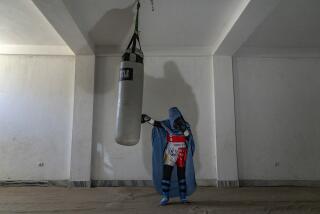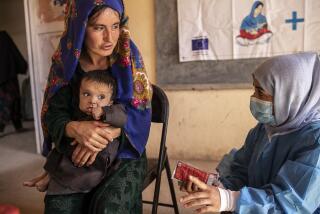From the Archives: Afghanistan Center is her monument to her great love
Reporting from Kabul, Afghanistan — It was an extramarital affair that scandalized Kabul. It would also fuel a lifelong adventure and help create a legacy for Afghanistan.
Author Nancy Hatch Dupree, eightysomething, recently opened the Afghanistan Center at Kabul University to commemorate her great love, archaeologist Louis Dupree, and return something to the country that brought them together.
Little did she know in 1962 when she arrived in Afghanistan what a twist her life would take. Her husband at the time, Alan Wolfe, was a diplomat assigned to the American Embassy in Kabul, the capital. The U.S. ambassador invited Nancy along as trip historian to Bamian, the site of two ancient Buddhist statues, because she’d studied Buddhist art.
On their return to Kabul, she mentioned to an Afghan tourism official how scandalous it was that no guidebook to the site existed. Write one yourself, he replied.
She jumped in, researching over several months information drawn from academic tomes that she then rendered in her characteristic witty, accessible English. As she neared completion, she had a couple of points to clarify and was directed to Louis Dupree.
“Who the hell is Louis Dupree?” she recalls thinking.
The ex-paratrooper and Harvard-trained archaeologist would later be described by historian and writer William Dalrymple as an adventurer who “made Indiana Jones seem positively suburban.”
She tracked down Dupree and left the manuscript, returning a few days later to find he’d trashed it, noting, “Adequate but nothing original.” She thanked him, and as she stormed out, she turned around and said, “This is for tourists, not academics.”
“Wait, come back,” he called after her.
“I did and never left,” she said recently. “Who knew why he called me back, although I was not too unshapely at the time. I think he liked my spirit.”
Their romance blossomed, but that meant a double divorce since he was also married. They spent time apart to finalize the paperwork.
When Nancy returned to Kabul to be with Louis, the scandal was the talk of the town, all the more so when her ex-husband married Louis’ ex-wife. Confronted with the wife- and husband-swapping in his delegation, the U.S. ambassador decided to face it head on by hosting a huge engagement party for Nancy and Louis at the embassy. They were married in 1966.
Born in Cooperstown, N.Y., Nancy inherited a love of adventure from her father, a rural development expert, and her actress mother, who raised her in the U.S., India, Costa Rica and Mexico. Louis, who was born in North Carolina and spent time behind enemy lines during World War II, had a passion for Afghanistan that was infectious, Nancy said.
For years, the couple lived a charmed life. Louis would travel to prehistoric Afghan digs and she’d tag along, collecting material for her five guidebooks — well regarded for their humor, insight and breadth — and for hundreds of articles.
He made several important discoveries of sophisticated ancient tools so impressive that scholars called their creators the “Michelangelos of the Paleolithic.” (Many of his finds would be looted from the Kabul Museum by the mujahedin and the Taliban.)
When winter cold set in, the couple would retreat to Kabul — then known as the Paris of the East, with its jazz bands, cafes, short skirts and rich social life — hosting evening cocktail parties dubbed the “five o’clock follies.” Louis kept promising Nancy a honeymoon. She recalled that she repeatedly responded: Every day with you is a honeymoon.
Everything changed in 1978, however, when Afghan Marxists staged a coup. Louis was accused of being a CIA agent, not unfathomable given that British spies had long used archaeology as a cover. Interrogators were particularly interested in the five o’clock follies, which apparently were seen as some secret society. When the Marxists detained him for 10 days, they went to the couple’s house and mistakenly grabbed Nancy’s suitcase. “He was in jail and all he had to wear was my underwear,” she said.
hey were deported. They applied for asylum in Pakistan and spent the next decade shuttling between the United States, where Louis taught at Duke University and gave lectures at several top colleges, and Peshawar, with its burgeoning Afghan refugee population. Periodically, he would slip into Afghanistan with mujahedin rebels. His 1973 book, “Afghanistan,” remains a primary source on the country’s history and culture.
During their years in Peshawar, then as now a wild frontier city, Nancy moved in diverse circles that led to a brief encounter with a young Osama bin Laden, who approached her about exporting heavy construction equipment to Afghanistan. She couldn’t help him, and he moved on. She recalls a shy, soft-spoken man.
She also made friends with Hamid Karzai, Afghanistan’s president, who helped her circumvent a few hurdles to establishing the center.
She’d visited Kabul several times during the Taliban years, a rare foreigner allowed in because of her long-established links to the country. Many Taliban were ordinary, if supremely unqualified, officials trying to do their job, including illiterate librarians hired solely for their religious or political credentials.
“They’re not all with horns and forked tails,” she said, her white hair pulled back in a bun, wearing a black sweater, dark flower-patterned dress and tassel loafers.
After her husband died of cancer in 1989, Nancy remained in Pakistan to continue the work they’d started: collecting United Nations, charity and foreign government reports about Afghanistan that others considered rubbish. The growing trove of documents was stored in their two-story home.
At one point, she heard rumors that the Taliban planned to destroy the Bamian statues and routed a message to reclusive Taliban leader Mullah Mohammed Omar. He was sympathetic, but even militants have their organizational problems.
“Mullah Omar issued eight different proclamations about preservation, including for Bamian,” she said. “But hard-liners at a cabinet meeting decided to blow it up.”
That was evidence that he was losing clout to Al Qaeda extremists, she said.
“I felt sort of sorry for him,” she said. In a move that shocked the world, the Taliban destroyed the two statues in 2001 with dynamite, rocket launchers, tanks and antiaircraft guns.
When the Taliban fled after the 2001 U.S.-led invasion, many emigres rushed back to Kabul. Nancy waited in Peshawar, concerned that a hard-liner with a match — or an American “daisy cutter” bomb — could destroy the valuable papers.
Finally in 2005, she loaded about 36,000 documents into 299 plastic fertilizer bags and smuggled them to Kabul in trucks and on buses without losing a page. Once in Afghanistan, the collection of books, magazines, U.N. crop tables and mujahedin reports tripled.
This created storage problems that ultimately led Nancy to campaign to create the $2-million Afghanistan Center, which opened in Kabul University this year. Her efforts were inspired by her late husband’s belief that for Afghanistan to prosper, it needs an informed citizenry. Funded by the U.S., Afghan and Western European governments, it stands as a vote of confidence in a nation better known for blast walls and barbed wire. The collection is now being digitalized so it can be enjoyed globally — and survive the next war.
“It’s fantastic that Nancy’s been able to do this,” said Nasrine Gross, a Kabul-based sociologist. “Collecting information from all sides in this divided country is great and will hopefully help teach the scientific method. But we also need to produce a generation of educated people, to reconnect, peel away the layers of lies that those in authority put on you.”
Nancy’s half-century love affair with Afghanistan has seen her guide countless relief efforts, help refugees, advise the U.N. and inform journalists. Among her pet projects these days are mini-libraries — books in a box — sent to provinces, including areas controlled by the Taliban.
She’s an equal opportunity critic. She condemns the North Atlantic Treaty Organization‘s strategy, saying it is crafted by misguided foreigners hiding in heavily guarded compounds who rarely meet Afghans.
“You don’t win hearts and minds by throwing around big chunks of money with no purpose,” she said. “Development takes a long time, lots of cups of tea.”
She’s also critical of Afghans whose society has deteriorated into chaotic infighting.
“Afghans have been a tolerant people, with ethnic groups living in peace for centuries,” she said. “These days every time things seem to be going in the right direction, someone always wants to stir the pot, fanning ethnic differences, screaming this or that person is not a good Muslim.”
Approaching her 10th decade, she’s handing off more responsibility to Afghans and talks about returning to the U.S., recounting her father’s advice that anyone hanging on too long is a failure. But she’s lived too many adventures to relish settling in a house in the American countryside and watching the birds.
“What do you do with yourself when you get old?” she said. “I don’t recommend it.”
More to Read
Start your day right
Sign up for Essential California for the L.A. Times biggest news, features and recommendations in your inbox six days a week.
You may occasionally receive promotional content from the Los Angeles Times.






